On the one hand, Caroline is so right that it would be utterly miserable to find myself so desk-bound that I had to pull out of all the human situations which give me such joy and fulfillment. I'll never be an enthusiastic administrator, (though I hope I may be a competent one in time) and I firmly believe in collaboration rather than any sort of hierarchical style of leadership....which of course brings me to the opposite horn of the dilemma,- the risk that in ensuring I don't "miss out" on the things I love, and feel called to, I fall into the "vicar does it all" model of ministry, which would be equally hideous. Having loved my time as a Reader and Local Ministry Team member, and grown hugely through that experience, I hope I always keep the priesthood of all believers and the essentially collaborative nature of healthy ministry always before me. Thankfully, I've a wee while longer before I have to work out this irl...but the opportunity to think things through is hugely helpful.
The other question, of course, is the one highlighte by Tom - what is likely to be the most helpful expression of church for this generation. I laughed out loud, because in my enthusiasm for the substance of Giles Fraser's words, I had totally failed to notice his insistence that it was what happened "on Sunday" that lay at the heart of parish ministry. The giggle was because I'm part of our diocesan team focussing on building up "fresh expressions" and spend much of my time reminding all and sundry that church does not have to be what happens within the four walls of St M's on a Sunday morning. I walked into that one with my eyes wide open, didn't I?!!
My defence of myopia would be that it's actually the act of offering the whole life of the community to God, in all the variety that Fraser describes, which lies at the heart of priesthood...Because that theology of Eucharist came spoke so clearly to me, I relegated the other implications of his words firmly to the background.
I think I'd want to question Tom's idea that breaking bread is perhaps not the best way in...In those embryonic Christian communities I have experience of (particularly the after school children's group that happened in our old benefice) the concrete nature of Eucharist seemed to provide a very accessible way for everyone to engage with God. The worship and conversation that happened apart from this always seemed to have less impact...and in terms of sheer numbers, it was the Family Eucharists that drew the largest congregations of non- regular attenders. Informal services of the word just didn't have the same effect at all. At St M's, my experience of worshipping with those outside the inherited congregation also supports this.
Breaking bread at Little Fishes and OpenHouse also seems to bring us straight onto holy ground.

I'd agree that it isn't the whole story, (though I am probably one of those whose views are sometimes derided as the "Eucharist and chips" brigade) but I really do believe it can work as a mission tool. Mass Culture seemed to support this view - and I'm looking forward to hearing Tim Sledge on the subject at a Praxis day later this year. Meanwhile, there's surely plenty to think about.
2 comments:
Did you hear Barbara Glasson at Greenbelt, talking about her "church" in Liverpool city centre which evolved out of a meeting two mornings a week where people made bread? I didn't go, but a friend did (Stella) and was so enthusiastic that I bought the book - I Am Somewhere else (can't do links in comments): it's wonderful on the incarnational and eucharistic significance of breadmaking as the heart of what is now a continuing community. Actually, it's generally wonderful!
I loved the Giles Fraser peice too, Sunday and all.
Well, we've always known that Choral Matins was the true answer...
I'm sorry - that's flippant. But in truth, while it's all very well saying that breaking the bread is the best way in, in reality, because we faff around with confirmation etc, it can actually be a very real barrier...however much we say that 'all are welcome' at the Lord's table if they wish to come, many people in the church don't feel like that, and many people who aren't confirmed feel that they 'shouldn't'. They're 'not allowed to'.
So what is the answer? I was being mentored today at work, and the woman doing it said firmly that it's no good identifying a problem if you don't also identify a solution. Certainly we need to emphasise before those services where there are many 'non-St Mary's people' that they are ALL welcome - for a blessing, or to take communion if that is the right thing for them (blow the congregation). Longer term, trying to draw new people in? Well, (a) do we need to? If they're out there in CK, and don't want to be in St Mary's, shouldn't we be finding ways to go to them (shall we join the social club?). Oh dear - I'm not making much sense, am I?!
Post a Comment